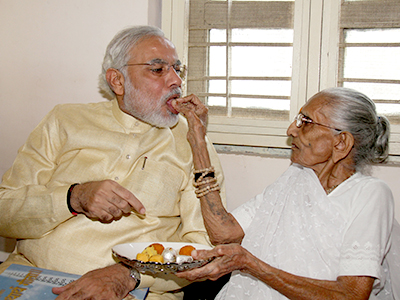Narendra Damodardas Modi born 17 September 1950) is the 15th and currentPrime Minister office since 26 May 2014. modi a leader of the Minister of Gujrat from 2001 to 2014 and is the Member of Parliament (MP) from Varansi. He led the BJP in the which gave the party a majority in the Lok Sabha (the lower house of the Indian parliament) – a first for any party since 1984 – and was credited for 2014 BJP electoral victories in the states of Haryana, MaharastraJhaarkhand and Jammu and kasmir..
Since taking office as Prime Minister, Modi's administration has focused on reforming and modernising India's infrastructure and government, reducing bureaucracy, encouraging increased foreign direct investment, improving national standards of health and sanitation and. Modi has been appreciated for starting initiatives like and Digital india Earlier, as Chief Minister of , Modi's economic policies (credited with encouraging economic growth in Gujarat) have been praised, although his administration has also been criticised for failing to significantly improve the human development in the state and failing to prevent the Despite his progressive initiatives, Modi, a and a former member of the (RSS) is a controversial figure domestically and internationally.Known for his , he is the second most followed
politician on after U.S. President  After accusations of anti-Muslim rhetoric during the campaign, during Modi's second term his emphasis shifted from to Gujarat's economic development. He curtailed the influence o organisations such as the (BKS) and the(VHP),entrenched in the state after the decline of Ahmedabad's textile industry, and dropped (an ally of former Sangh co-worker and VHP state chief from his When the BKS staged a farmers' demonstration Modi ordered their eviction from state-provided houses, and his decision to demolish 200 illegal temples in deepened the rift with the VHP. Sangh organisations were no longer consulted or informed in advance about Modi's administrative decisions.
After accusations of anti-Muslim rhetoric during the campaign, during Modi's second term his emphasis shifted from to Gujarat's economic development. He curtailed the influence o organisations such as the (BKS) and the(VHP),entrenched in the state after the decline of Ahmedabad's textile industry, and dropped (an ally of former Sangh co-worker and VHP state chief from his When the BKS staged a farmers' demonstration Modi ordered their eviction from state-provided houses, and his decision to demolish 200 illegal temples in deepened the rift with the VHP. Sangh organisations were no longer consulted or informed in advance about Modi's administrative decisions.
 After accusations of anti-Muslim rhetoric during the campaign, during Modi's second term his emphasis shifted from to Gujarat's economic development. He curtailed the influence o organisations such as the (BKS) and the(VHP),entrenched in the state after the decline of Ahmedabad's textile industry, and dropped (an ally of former Sangh co-worker and VHP state chief from his When the BKS staged a farmers' demonstration Modi ordered their eviction from state-provided houses, and his decision to demolish 200 illegal temples in deepened the rift with the VHP. Sangh organisations were no longer consulted or informed in advance about Modi's administrative decisions.
After accusations of anti-Muslim rhetoric during the campaign, during Modi's second term his emphasis shifted from to Gujarat's economic development. He curtailed the influence o organisations such as the (BKS) and the(VHP),entrenched in the state after the decline of Ahmedabad's textile industry, and dropped (an ally of former Sangh co-worker and VHP state chief from his When the BKS staged a farmers' demonstration Modi ordered their eviction from state-provided houses, and his decision to demolish 200 illegal temples in deepened the rift with the VHP. Sangh organisations were no longer consulted or informed in advance about Modi's administrative decisions.
His 2002–07 changes have led to Gujarat's description as an attractive investment destination. According to Aditi Phadnis, "There was sufficient anecdotal evidence pointing to the fact that corruption had gone down significantly in the state ... if there was to be any corruption, Modi had to know about it" He established financial and technology parks in Gujarat and during the 2007 summit, real-estate investment deals worth ₹6.6 trillion were signed in the state.In March 2008 the asked the state government to re-investigate nine cases from the 2002 riots (including the , establishing a Special Investigation Team (SIT).] In response to a petition from Zakia Jafri (widow of who was killed in the Gulbarg Society massacre), in April 2009 the court asked the SIT to investigate her allegation that Modi and another minister were complicit in the killings The SIT questioned Modi in March 2010; in May, it presented to the court a report finding no evidence to substantiate the allegations.In July 2011, submitted his final report to the court: contrary to the SIT position,
Modi could be prosecuted based on the available evidence. The team criticised Ramachandran's report for relying on testimony from who they said fabricated the documents used as evidenceThe Supreme Court gave the matter to the magistrate court, with the SIT examining Ramachandran's report. The team submitted its final report in March 2012 seeking closure of the case, with Zakia Jaffri filing a protest petition in response. In December 2013 the magistrate court rejected the protest petition, accepting the SIT's finding that there was no evidence against the chief minister.
No comments:
Post a Comment